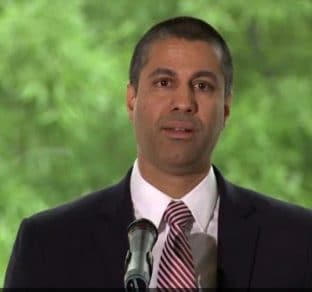WASHINGTON, D.C. — The First 100 Days. Many media organizations have turned to the White House, and its accomplishments (or lack thereof) since the transition in power from President Obama to President Trump. On Friday, they had a new individual in D.C. to turn their attention to, as FCC Chairman Ajit Pai shared with a conservative think tank with heavy influence what he’s done since succeeding Tom Wheeler as the Commission’s leader.
In lunch-hour remarks delivered on Cinco de Mayo (5/5) to the American Enterprise Institute, just hours after an interview recorded Friday with NPR’s Morning Edition aired nationwide that shared with America his reasons for stripping “net neutrality” regulations, Pai devoted much of his auditorium address to “bringing the benefits of the digital age to all Americans.”
But, he also discussed his efforts to modernize the FCC’s rules and eliminate “unnecessary regulatory burdens.” This includes the relaxation of third-party fundraising restrictions to permit many noncommercial television and radio stations to air limited fundraisers for the benefit of other non-profit organizations; easing the reporting burden for volunteer board members of noncommercial broadcast stations; and the elimination of public correspondence file requirement for broadcasters.
Radio broadcasting companies can also salute, or jeer, Pai for giving AM broadcasters greater flexibility in locating their FM fill-in translators.
Meanwhile, the TV industry is largely ecstatic over an adopted proposal to allow broadcasters to voluntarily use the Next-Generation Television standard, ATSC 3.0.
Opening his remarks, Pai thanked Jeff Eisenach for his “scholarship and friendship.”
Democrats will likely express their displeasure over their cozy relationship. Since November, Eisenach has had an influential role in shaping technology and telecommunications policy at the Commission, and was called upon to lead the Trump administration’s FCC transition team. He’s also been rumored to be under consideration for a seat on the Commission.
“AEI and its scholars are doing tremendous work by making the case for expanding freedom, extending individual opportunity, and strengthening America’s free enterprise system,” Pai said. “In particular, AEI has shown thought leadership on communications policy, and much of the credit goes to Jeff Eisenach.”
He then took a swipe at his most recent predecessors in noting how much was already accomplished under the Pai FCC’s First 100 days, compared to the First 100 days under Tom Wheeler and First 100 days under Julius Genachowski.
“By any objective measure, we’ve hit the ground running and have had a very productive three-plus months at the Commission,” Pai said. “Just one data point: In my first 100 days, the FCC adopted 49 items. To put that number in perspective, during the prior two permanent Chairmen’s first 100 days, the Commission adopted 25 and 34 items.”
Pai didn’t even mention the conclusion of the first-ever incentive auction — only in his closing remarks, when he noted he didn’t do so.
But, he did note that the First 100 days of accomplishments were a team effort.
“Commissioners Clyburn and O’Rielly have been critical partners in the Commission’s work,” Pai said. “For example, when it comes to closing the digital divide, Commissioner Clyburn has played a vital role. And whe,n it comes to process reform and easing unnecessary regulatory burdens, I could have no better partner than Commissioner O’Rielly. So I’d like to take this opportunity to publicly thank my colleagues for everything they have done. Even in those rare instances where we have disagreed, our exchange of views has made for a better work product.”





